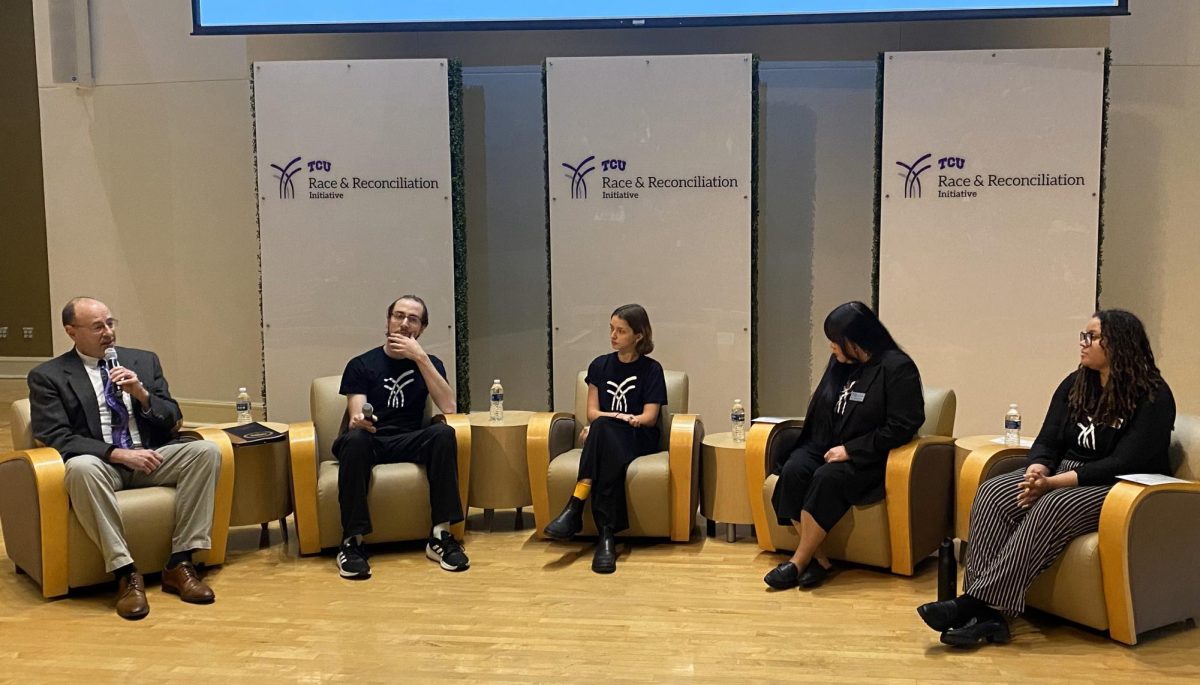Hundreds of TCU students are taking photos with “Not On My Campus” written on their hands this week, but the message is more important than the act.
“It’s more than about getting a Sharpie and writing on your hand,” said Cody Westphal, student body president.
By taking the picture, students spread awareness and shape behavioral norms of sexual assault on TCU’s campus, Westphal said.
(Images courtesy of the Not On My Campus TCU Facebook page)
The campaign tries to alter behavioral norms by emphasizing what is right and wrong to students. “The idea of knowing right from wrong is the only thing that can really help,” Westphal said.
The Not On My Campus campaign:
Westphal said talking about the issue is vital in changing the “norm.”
“When I was a [first-year student], no one really talked about it,” Westphal said.
But, when Westphal brought the campaign from Southern Methodist University to TCU last year, things changed.
“I feel like, now, students are more likely to seek help from a [Resident Assistant], come see me, or say something to a counselor…because they understand the issue more” said Assistant Dean of Campus Life Leah Carnahan.
More than 250 students participated by taking photos last year, Westphal said. But, this week’s campaign already reached that number by Tuesday.
The campaign began Monday and will end Thursday afternoon. During the campaign, students have taken photos by the Founders’ Statue and Frog Fountain with “Not On My Campus” written on their hands.
“My goal is to reach a thousand participants, and at the rate we are going, who knows!” Westphal said.
Another way to support the campaign is to “like” the Not On My Campus TCU Facebook page. It has more than 1,200 “likes,” mostly from TCU students.
Some students said they support the campaign because of the potential social change.
“I am a big advocate of the campaign because I believe it has the ability to trigger social change on campus,” said Ali Wittenberg, a sophomore nursing major.
And some students support the campaign because sexual assault has impacted many people.
One in 16 college men and one in four college women are sexually assaulted, said Westphal, who received his information from Campus Life.
“More people have been a victim of sexual assault or had a family member or friend who was sexually assaulted…There is a lot of direct and indirect impact,” Carnahan said.
TCU and sexual assault
TCU had eight reported sexual assault in 2013 and 11 in 2012, Carnahan said.
There have been 10 reported sexual assaults at TCU since school began in August and TCU is required by the Clery Act to disclose sexual assault statistics.
Sergeant Kelly Ham of the TCU Police Department said he’s seen a recent rise in reported sexual assaults.
“We’ve been getting more reported this year than I’ve seen in my 30-year career,” Ham said.
But, the numbers are not a true representation of how many sexual assaults happen on campus. Ninety percent of sexual assaults on college campuses are never reported.
“I think it’s because of the nature of the crime. It’s more private,” Carnahan said.
How to handle sexual assault: before and after
“I have seen, over the last 10 to 20 years, that the majority of sexual assaults involve alcohol,” Ham said.
Crisis Connection says that 90 percent of rapes happen after the consumption of alcohol.
“So I am hoping, for both males and females, that they are cautious of drinking alcohol because it can lead to crimes,” Ham said. “And one sexual assault is too many.”
If a student is sexually assaulted, TCU offers counseling at the Counseling & Mental Health Center and access to the Brown-Lupton Health Center to receive a health exam.
“They cannot do a rape kit but they can check for [sexually transmitted diseases],” Carnahan said.
Carnahan says that it is most important for the person who was sexually assaulted to know that they are not alone.
That is one of the goals of the Not On My Campus campaign, Westphal said. “I strongly believe that that will make people who are victims come forward sooner because they feel supported.”
Looking Forward
SGA wanted to unite the campus on this issue to create a sense of safety for those who have been sexually assaulted, Westphal said.
The Not On My Campus organizers uploaded a video on Youtube on Sunday that talked about TCU “being a family” and the need to unite as a community on this issue.
The effort to end sexual assault on TCU’s campus has been noticed by the TCU community.
“I appreciate that the Student Government Association has taken the time and made the effort to end sexual assault on TCU’s campus,” Wittenberg said.
The issue will continue to be discussed in April because it is Sexual Assault Awareness Month.
TCU Campus Life plans to host an event on April 15 in the Brown-Lupton University Union Auditorium at 6:30 p.m. Campus Life will be showing the Hunting Ground, a documentary that looks at sexual assault.
https://www.youtube.com/watch?v=ClyQNdy7JLM&feature=youtu.be




